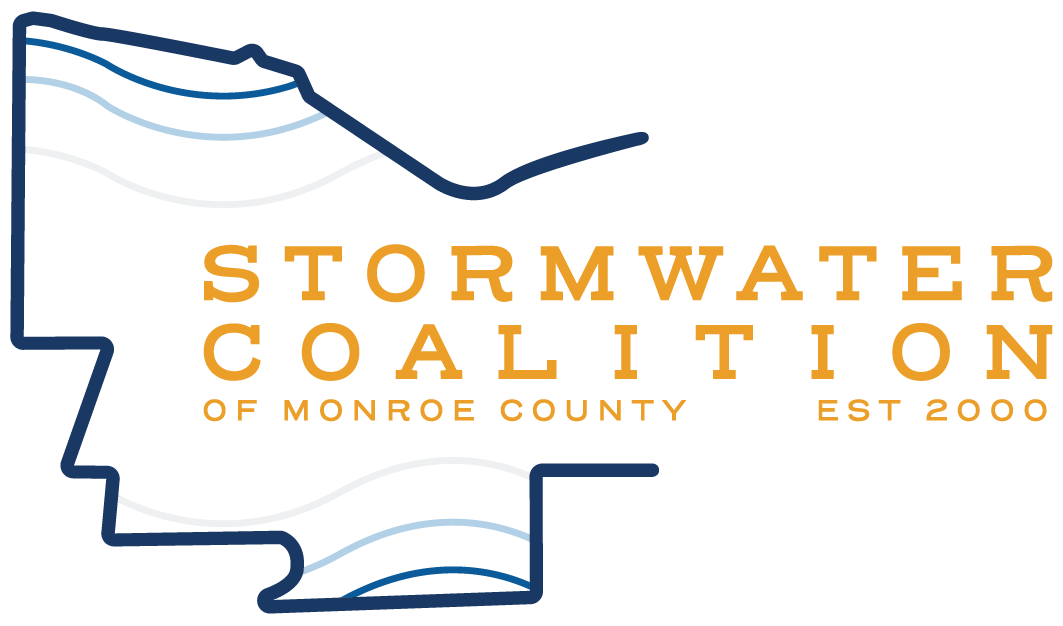Monroe County Residents
A number of communities and partners within Monroe County have joined together to develop a stormwater management program to protect our waterways and enhance our quality of life.
Our goal is to utilize regional collaboration to identify existing resources and develop programs to reduce the negative impacts of stormwater pollution.
Many residents of Monroe County might not realize they live in a watershed. Although it may be apparent for those living next to a stormwater wetland or stormwater pond, all precipitation will end up in a local waterway.
Explore the below map to see which of the 24 major watersheds you reside in.
H2O Hero
In 2007, the Stormwater Coalition of Monroe County, and Causewave Community Partners teamed up to educate Monroe County residents about their impact on water quality through a program known as Monroe County's H2O Hero. Today, learning to become an H2O Hero and protecting our water is a message that can be found throughout Monroe County parks, museums, and even the Seneca park Zoo.
Find H2O Hero on Facebook and Instagram
Household Maintenance Tips
Lawn Care & Landscaping
There are several options for residents who wants to reduce stormwater pollution at home. Only use pesticides and low phosphorus fertilizer when necessary and always notify neighbors when pesticides are used. For a sustainable alternative mulch with leaves and grass clips. Use a broom rather than a hose to sweep debris away from storm drains.
Downspout Disconnect
Roof downspouts can be connected to the stormwater system to prevent standing water. Unfortunately, this can contribute to flooding downstream and impact water quality. Disconnecting the downspouts from your roof, and directing the water to a rain barrel, rain garden, or at least 10’ away from foundation on your lawn, will reduce the amount of water that enters the stormwater system.
Rain Barrels
Rain barrels are designed to collect and store the runoff from your roof for later use in your garden or landscaping. Rain barrels and cisterns have been around for centuries and are becoming increasingly popular as an easy, low cost method of reducing stormwater runoff and protecting water quality. A properly designed rain barrel includes an adequately sized overflow directed to an area which can safely receive this runoff.
Rain Gardens
A rain garden is a planted, shallow depression that is designed to soak up runoff from your roof or driveway. Add compost to increase the rate at which water soaks into the ground. A rain garden should be placed at least 10’ from your home’s foundation. Native plants that are attractive and adapted to highly variable amounts of water are a popular choice for rain gardens. Rain gardens are low maintenance, and only require occasional weeding.
Pet Waste
An estimated 110,000 dogs live in Monroe County. Pet waste from dogs or cats are not natural fertilizers and if not picked up ends up in our waterways. Nutrients in pet waste make it unsafe to swim, increasing eutrophication leading to algae growth. Insufficient disposal of pet waste is not only illegal, it’s bad for the environment.
Household Chemicals
Never dispose of household cleaners, paint automotive fluids, fertilizer or pesticides through the drain or trash collection. These hazardous materials can lead to stormwater pollution if not disposed of properly. Monroe County residents can visit Monroe County’s EcoPark to dispose of household hazardous waste.
Car Maintenance
Cars washed on the street or driveways can contaminate our waterways with grease, motor oil, metals, and detergent. When providing at home car maintenance never dump antifreeze, transmission fluid, motor oil or other hazardous waste. Used oil from one oil change can pollute up to a million gallons of freshwater.
Septic System Maintenance
For homes with septic systems, septic tanks should be pumped out every 2-3 years. Proper septic system maintenance can prevent household sewage from leaking into your lawn and into our waterways.
Pools, Fountains & Spas
Water treatment chemicals in home pools, fountains and spas can be detrimental to aquatic life. Chlorine, algaecide, acid and other chemicals should be handled, stored and disposed properly.


